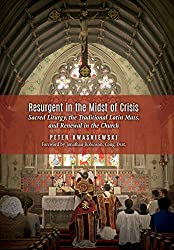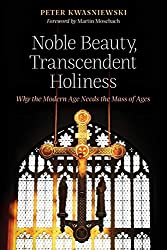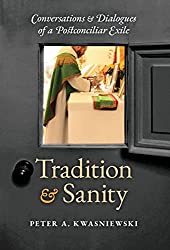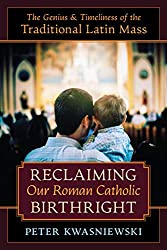
For generations now, we inhabit a world in which arguments are increasingly materialistic, rationalist or utilitarian.
Such arguments were used to introduce the liturgical innovations of the 1960s, e.g. it is better that liturgy be in the vernacular, comprehensible to all.
And what could be more sensible, more rational than that? At least, such questions express the impoverished mindset that millions of Catholics now inhabit.
However, things of “noble beauty and transcendent holiness” can never be fully understood – much less demonstrated! – along lines that remain purely “materialistic, rationalist or utilitarian”.
No, other deeper, more subtle and profound arguments are needed for the liturgy, arguments that speak to the whole human being.
Now, of course, such arguments will never be irrational, for man’s rational capacities are God-given, and never wisely ignored. But, in this tragic epoch, what is burningly needed is argumentation that both embraces and transcends ordinary rationality (“trans-rational” if you like).
The glory of Peter Kwasniewski’s new book Noble Beauty, Transcendent Holiness is that its author both understands the crying necessity for these arguments, and also elegantly provides them, in a manner that speaks to heart and mind, soul and imagination.
Yes, this book is written beautifully. The fact Kwasniewski speaks with not only poetic sensitivity but also precision and lucid analysis only heightens its power. (Indeed, there are passages written with such economy and exactitude that the effect is like a bullet at close range – one wonders if it is even possible to render these subtle, yet crucial observations in a more satisfying manner.)
In short, Kwasniewski’s book will not only fortify those already convinced that the ecclesiastical crisis is, above all, the crisis of the liturgy – but also persuade those still wavering on the edges, still not quite convinced, still not quite able to shake-off the seductions of modern rationalism.
I pray it will be widely read, circulated and recommended to anyone at all who might be open to its message.
If this book could, then, only reach those who remain sitting on the fence – and there must be millions of them! – the good it might do for the Church is unimaginable.
If you care about the the future of the Church, buy it, study it and communicate its message to your friends by whatever means you have.
Extract: Hope for the Church
The review was originally a short review written for Amazon. Now, we are in need of hope and now that I publish the review here I will just add one excellent passage from the book that speaks to hope for the Church and may whet the reader’s appetite for more …
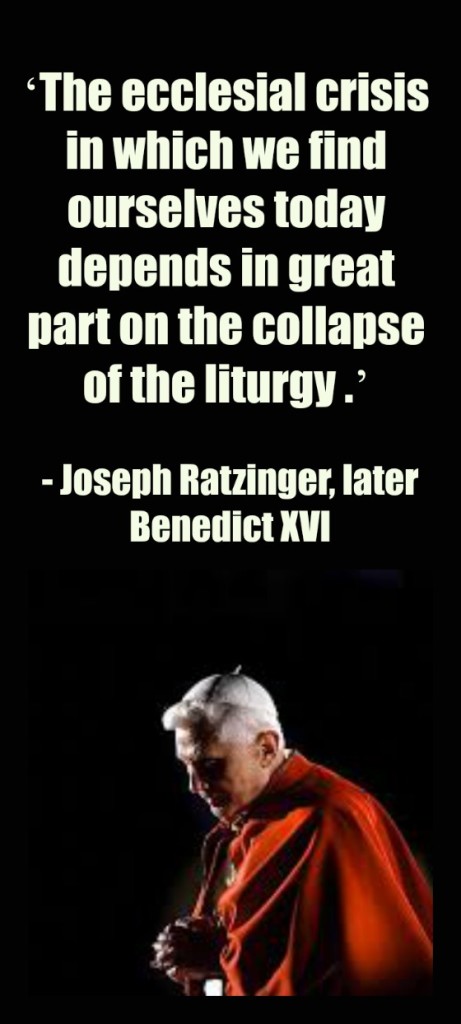
If one reads a lot of Catholic literature from the late sixties and throughout the seventies and eighties, one encounters a peculiar smugness in the authors, a self-satisfaction at the success of what they could easily have dubbed their own “Glorious Revolution.” They believe that they have sung a new Church into being, “just like that,” built on the ruins of centuries of fortress-mentality Counter- Reformation Catholicism, now safely leveled to the dust.
But as the years roll on, and especially after the unexpected advent of Benedict XVI, a new note begins to be sounded in the magazines, journals, and newspapers of the regnant party—a note of anxiety about the increasingly undeniable fact that there is now an alternative to the prevailing paradigm.
There is, surprisingly, competition in the open market. Suddenly one hears the former partisans of diversity and experimentation thunderously condemning the presence of the Other, because it simply does not belong. Alterity is all fine and good until it is really significant alterity.
Then it has to be melted down and poured into the popsicle tray of institutional uniformity. The promoters of diversity suddenly sound like those who support a “free market” as long as it favors big government and big corporations.
Wherever it springs up, the traditional Roman Rite attracts God- thirsting souls, and Catholic culture starts to spring up again along- side of it, or rather, within it and from it.
Yet in many places, this new opening to grace is not tolerated by the establishment. The fallacy of a petitio principii rears its head: “Because people aren’t interested, and no one will come, therefore we won’t make it available.
This is the desperate maneuver of one who is afraid of something— afraid, perhaps, that what was sacred and great for past generations of Catholics might be found to be sacred and great by Catholics today who never knew it before.
Italics have been added. For the desperate mentality this evokes so well is indeed a sign of hope.
Foreword for Monarchy by Roger Buck

Buying Books at Amazon Through These Links Gives Us a Commission. This Supports Our Apostolate. Thank You if You Can Help Us Like This!

